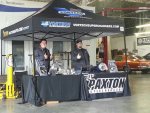A supercharger is a parasitic device, meaning it uses horse power to create boost, while a turbo uses "free" exhaust gas to create boost.
Aquired from another site.
http://www.automotivearticles.com/Supercharger_vs_Turbocharger_.shtml
THE CASE FOR SUPERCHARGING
Since a crank driven s/c (s/c = supercharger) is what people are normally talking about when they use the term supercharger, I will no longer say "crank driven" to make the distinction between it and a turbo. Now using a supercharger makes a ton of sense simply because it only has a direct effect in pressurizing the engine on the side we want it to, the induction side. Since pressures will always be higher here than in any other part of the system (except of course during the engine's power stroke, but that's always sealed off from the rest of the system so we can forget about that complexity), it's very easy to make this combination a powerful one. NA engines often use large amounts of valve overlap to get the whole system to work properly at higher RPM, which has obvious drawbacks in that it's possible for the intake system and exhaust systems to interact in a negative way (since they operate at similar pressures). It's sometimes just as easy to get air flowing backwards through the system as it is to go forwards in an NA setup, which is one reason camshaft choice is so important to where in the RPM band best power will be produced. And here is where the beauty of supercharging is; neither valve overlap amounts nor perfect exhaust system designs are completely essential to keep everything flowing in the right direction. No matter how long the exhaust is exposed to the intake system through valve overlap, air should NEVER pass backwards through the system unless the supercharger stops working.
THE EVIL OF SUPERCHARGING
The evil of supercharging is that some of the power we finally get from combusting the air/fuel mixture must go back into powering the supercharger. So here we have designed this whole system that works so well, yet we have to power it with some of our hard earned torque. This is not a good thing, but then again nothing so simple is ever going to come for free. Do superchargers work? Of course they do, which is why many racing engine uses the technology unless the rules prohibit it. The net result is more total power from the system, but a portion of this power must be sapped from our output to make it all work.
THE CASE FOR TURBOCHARGING
This section is easy to write, because it's exactly the same thing as the supercharger portion. We have all of the same advantages, except for one major benefit. That benefit is that turbocharging runs off what is largely wasted energy, so that **** drawback of needing to power the system with some of our hard earned torque is removed. In this way, a turbocharger addresses the one main drawback to using a supercharger, but as you will see in a second the supercharger addresses the one main drawback of turbocharging.
THE EVIL OF TURBOCHARGING
Hopefully you now understand why it makes so much sense to forgo designing engines for NA use and just supercharge the sucker instead, at least when we are talking about how to best make power. And if you have been following what I have said, you will also understand the bad effect turbos have on our little perfect world of pressure variation.
A turbo is an ingenious little design that harnesses the wasted kinetic energy we dump out through the exhaust system to actually force more air into the engine. This is good for the same reasons that supercharging is good, but it has one major drawback: it of course increases the pressure within a portion of the exhaust system. While turbocharging a motor increases the amount of air that can be flowed into it, it has a negative effect on how easily we can flow it back out again. This weakens our positive pressure difference between these two fundamental sides of the engine, and causes both cam timing & exhaust system design to again become extremely important to making good power. This is most certainly not a good thing, but can a turbo overcome this drawback with the other inherent good it possesses? It certainly seems so, because in most current forms of racing where the rules don’t probihit the use of tubos or slap restrictions on their use, the turbo reigns supreme in terms of engine power output.





